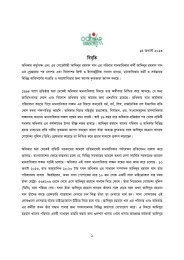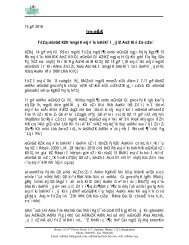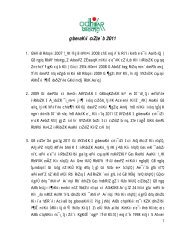Please - Odhikar
Please - Odhikar
Please - Odhikar
You also want an ePaper? Increase the reach of your titles
YUMPU automatically turns print PDFs into web optimized ePapers that Google loves.
charges saying 16-year-old Mathura did not raise any alarm and there was no sign of struggle as<br />
there was no injury on her person. It agreed with the trial court verdict, which was set aside by<br />
Bombay High Court, that she was habituated to intercourse!<br />
There has been a paradigm shift in the apex court's approach since then.<br />
Signs of the shift came in the Rafique case judgment in 1980, in which Justice Krishna Iyer said,<br />
"When a woman is raped, what is inflicted is not mere physical injury but the deep sense of<br />
some deathless shame…" and added that the response of the judiciary cannot be muted to such<br />
grave human rights violation.<br />
The Supreme Court has not looked back since. It took serious note of the fact that rape accused<br />
invariably attempt to cast aspersions on the chastity of the victim and term her of easy virtue to<br />
convince the court that his unpardonable act is condonable.<br />
In 1991, in the case of State of Maharashtra vs Madhukar N Mardikar, the Supreme Court put a<br />
legal halt to such pleas. It said: "The unchastity of a woman does not make her open to any and<br />
every person to violate her person as and when he wishes, She is entitled to protect her person if<br />
there is an attempt to violate her person against her wish. She is equally entitled to protection of<br />
law. Therefore, merely because she is of easy virtue, her evidence cannot be thrown out."<br />
Former CJI and Chairperson of National Human Rights Commission Justice A S Anand says:<br />
"Rape is a crime more serious than murder as it destroys the very soul of the hapless female."<br />
Another pertinent issue may be mentioned here. The right to self-defense does not extend to<br />
handing out a disproportionate response to the aggressor. In a significant ruling, the Supreme<br />
Court has ruled that the victim could land on the wrong side of the law if the harm caused to an<br />
assailant is much more than required to defend oneself.<br />
In an important rider to the valuable right, the court said a person on the receiving end of<br />
violence cannot, on the basis of injury received, claim to justify the retaliatory blows on the<br />
aggressor as exercise of the right to self-defense. If retaliation is excessive, the law will not<br />
support claims to self-defense.<br />
This ruling was handed out recently by a Bench of Justice S B Sinha and Justice R V<br />
Raveendran while delivering two judgements in cases where the right to self-defence was<br />
invoked. One incident related to forcible cutting of paddy and the ensuing violence in Bhadsa,<br />
Purulia. The second had to do with a clash in Devanandpur, UP, over burning of 'Holika'.<br />
Justice Sinha said private defense could be used to ward off unlawful force and to prevent it, to<br />
avoid unlawful detention and to escape from such detention. For defending one's land, moderate<br />
force could be used, he said. Defense of dwelling house, however, stands on a different footing.<br />
The Bench noted that the right to self-defense could not extend to causing the aggressor's death<br />
in cases like robbery, house-breaking by night, attempt to set house afire and theft.<br />
The court said it was aware of circumstances under which a person is forced to exercise the right<br />
to private defense. However, it said: "Right to private defense cannot be exceeded to cause more<br />
harm than necessary….. It is also well-settled that a right of private defense is unavailable to the<br />
aggressor. The need to act must not have been created by the conduct of the accused in the<br />
immediate context of the incident which was likely or intended to give rise to that need."<br />
Report 2005<br />
169











